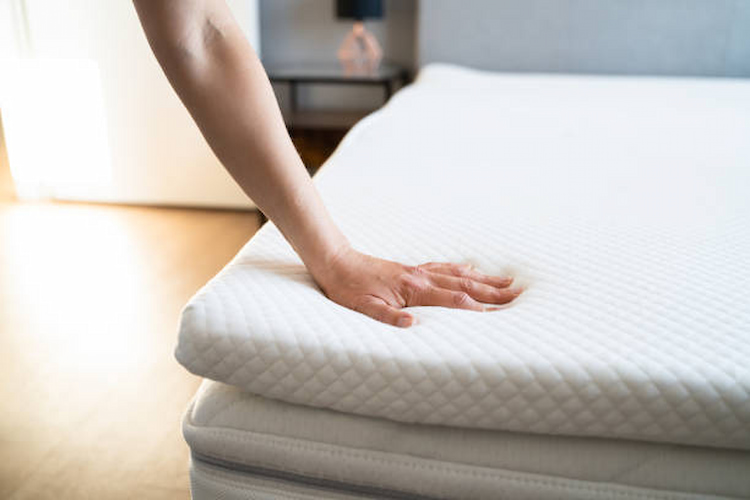Sleeping on a high-quality mattress can transform your rest, especially when it’s a memory foam model that provides the right balance of support and comfort. These mattresses offer the firmness your body needs for optimal spinal alignment, helping to alleviate discomfort caused by poor posture. As a result, many people experience better sleep quality and reduced pain when using a memory foam mattress.
Numerous studies have highlighted the benefits of sleeping on medium-firm memory foam mattresses, showing a significant reduction in pain and improvements in sleep quality. According to many studies, those who sleep on memory foam mattresses often report less pain and more restful sleep. The way a memory foam mattress cradles your body can make you feel as though you’re gently sinking into it, enhancing both your sleep and overall well-being.
What Is a Memory Foam Mattress?
Made from quality memory foam, the moulding memory foam mattress can give your body the needed support and comfort. These mattresses are designed to adapt to your body’s shape, providing pressure point relief and improving sleep quality.
The memory foam material was originally developed by NASA to cushion astronauts during space travel, and its ability to relieve pressure points has since made it a popular choice for mattresses. Unlike traditional mattresses that can press on your body, a memory foam mattress distributes your weight evenly, preventing pressure build-up.
Is It Better to Sleep on a Memory Foam Mattress?

source: istockphoto.com
The main advantage of a memory foam mattress is that it supports every part of your body without causing discomfort. This allows you to wake up feeling refreshed and energised. There are several benefits to choosing a mattress of this type.
Noise-Free Sleep
Few things are as precious as a quiet, undisturbed night’s sleep. Often, this peace can be interrupted by the sounds of your partner tossing and turning, or the creaking of the mattress. A memory foam mattress, however, offers excellent motion isolation, meaning movements are less likely to disturb you. This makes it an ideal choice for couples or restless sleepers, as it significantly reduces motion transfer.
Pain Relief
As mentioned, memory foam mattresses contain nothing but foam at their core, making them one of the most supportive mattress types available. This support is particularly effective with medium-firm or firm models, which contour to your body and help relieve pain by maintaining proper spinal alignment.
Body Temperature Regulation
Another advantage of memory foam is its ability to regulate body temperature. Many mattresses are made with advanced cooling technologies that promote airflow and increase breathability. Instead of trapping body heat, these models allow it to dissipate, helping you maintain an optimal body temperature throughout the night.
Variety of Densities
Memory foam mattresses come in a range of densities and thicknesses to suit different preferences. The density of the mattress affects how firm or soft it feels, with options ranging from low to high density. Medium-density mattresses tend to be the most popular, offering a balance between support and comfort. However, the best way to choose the right one for you is to test different densities and find what feels most comfortable.
Balanced Comfort
Regardless of the thickness or density you choose, memory foam mattresses generally offer a perfect balance between softness and firmness. They prevent the mattress from sagging or sinking over time, making them a great option for individuals of varying body weights.
Resistant to Dust Mites
Did you know that memory foam mattresses are also resistant to dust mites? The viscoelastic structure of the foam makes it difficult for dust mites to penetrate, which is a huge benefit for those who suffer from allergies. This feature helps create a cleaner and healthier sleeping environment.
Ideal Sleeping Positions for Sleeping on Such a Mattress
One of the key advantages of a memory foam mattress is its ability to adapt to various sleeping positions. Whether you sleep on your back, side, or front, a memory foam mattress will contour to your body, supporting your natural posture.
For front sleepers, memory foam can help minimise pressure on the chest and hips, making it a good choice for preventing spinal discomfort. A medium-firm mattress is ideal in this case, as it provides support without adding undue pressure.
Side sleepers can also benefit from memory foam, especially when using a soft to medium-firm mattress. The foam allows the shoulders to sink slightly into the mattress, keeping the spine aligned while providing relief to pressure points.
Back sleepers, too, will find memory foam beneficial, as it supports the spine, shoulders, and hips in alignment. This ensures a balanced distribution of weight and prevents discomfort from prolonged pressure on any one area of the body.

